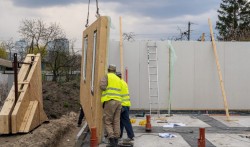Paul Nash, construction consultant, Jansons Property, explores why the adoption of MMC at scale within the housing sector failed to materialise and what needs to change for this to happen
Published in 2016, the influential Farmer Report characterised a construction industry that was, to quote the report, 'synonymous with a sick or even a dying patient'. With the housing crisis the UK is facing combined with dwindling supply, this remains the case today, and many are prescribing modern methods of construction (MMC) as the cure. However, the UK faces three main challenges that MMC undoubtedly has a role to play in averting but is by no means the solution to the issues – these being low productivity, structural fragmentation, and financial fragility. And while these challenges have driven greater global adoption of MMC, there are barriers within the business model for house building and planning systems in the UK, and until these are addressed, adoption of MMC at scale is not feasible.
And almost to add insult to injury, the aforementioned Farmer Report highlights between 2016 and 2026, approximately 62,000 workers are expected to retire per year; but the Government's latest figures show that only around 23,000 new apprentices will be starting each year. This exacerbates the labour shortage that was already established prior to the pandemic and changes to the immigration system following Brexit. Recruitment specialists, Search Consultancy, have produced research that analyses the effect of the labour shortage on various industries. The 2021 Mind the Gap report found that 83% of businesses within the construction industry are feeling the strain from a lack of skilled workers – 25% of respondents listing Brexit as a key contributing factor for this. These findings are supported by the CITB's (the industrial training board for the construction industry in Great Britain) Construction Needs Report for 2022-2026, which found that the availability of labour is now the number one issue within the UK construction sector.
Amongst the 'treatments' recommended for the industry by the Farmer report was the adoption of pre-manufactured solutions for the housing sector. The arguments were compelling, and the Government agreed, making MMC a core component of its industrial strategy and appointing the author of the report as its new 'MMC champion'. But six years later, the hoped-for adoption of MMC at scale within the house-building sector has mostly failed to materialise. And recently, several modular housing factories have been forced to closed due to 'underuse'*.
So, what is going wrong with the adoption of MMC at scale for housing?
The Farmer Report provides a clue when it calls on Government, as part of its housing policy planning, to work with industry to assemble and publish a comprehensive pipeline of demand in the new build housing sector. Government legislation is needed to initiate widespread change to the current system if we are to see MMC succeed as it does in other countries, such as Scandinavia, where approximately 45% of all new homes built now utilise MMC. This followed the 2019 Nordic Declaration on Low Carbon Construction and Circular Principles in the Construction sector. And as a result, a 2020 Lindbacks report on Swedish experiences of MMC: 90% of single-family homes are prefabricated, 60-70% of multi-family homes have some prefabricated elements, and 10% of multi-family homes are modular.
Source: PBC Today









